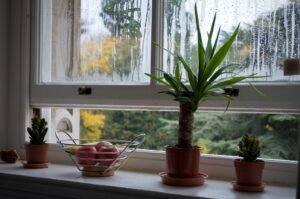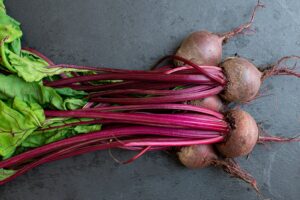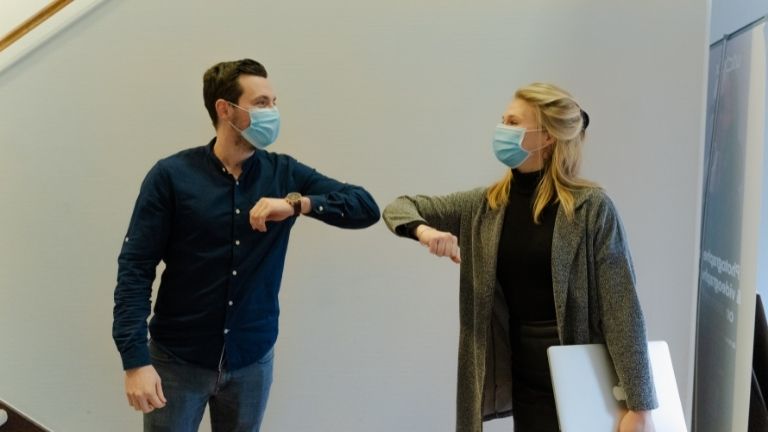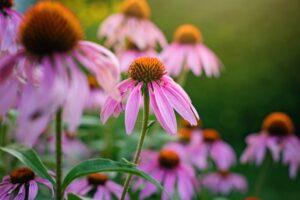Now that things are back to normal, we still need to take precautions when protecting ourselves from coronavirus. Healthista spoke to the experts on how to protect yourself
Lockdown restrictions have been relaxed and 70 per cent of the adult population has now been vaccinated against COVID-19.
But that doesn’t mean the virus has gone, that face coverings should be relegated to history or that easing back into ‘normal’ life hasn’t caused a range of conflicting emotions for many.
So, with all that in mind, what exactly do the experts suggest we do to protect ourselves, both physically and emotionally, internally and externally, as we learn to co-exist with coronavirus?
Simple & effective safeguards
One of the things the pandemic has taught us is that some of the simplest methods of protecting our health are also the most effective.
As Professor of Respiratory Medicine Pallav Shah from Imperial College London says, ‘The COVID-19 crisis has highlighted how hand washing is such a simple and effective way to help reduce the risk of infection and disease.’
Similarly, opening the windows and doors every day is a free and laughingly effective way to allow any potential airborne COVID particles to dissipate and be carried away.
Face coverings might no longer be legally required but it is still recommended they should be worn in crowded indoor areas and most of us want to go on protecting those around us.
If you are looking to upgrade your face mask, try The Silver Life Face Covering, recommended by The World Health Organisation made from a silver-based material proven to prevent airborne microbial infections. It is also made from environmentally friendly recyclable materials and is super comfortable.

For increased virus protection a new product called Oraldent Cold & Flu Guard, £9.99 (also available on Amazon), has been clinically proven to kill 99.99 per cent of SARS-CoV-2, the virus that causes COVID-19 within minutes.
Containing a patent ingredient called Flavobac which is a natural plant flavonoid, a concentrated extract that has been in development as a protection against viruses and bacteria, since 2004.
‘This is the first natural formulation that envelops and neutralises Covid,’ says Dr Glogauer, the Chief Science Officer of Oral Science, partners of Oraldent, the company that created Cold & Flu Guard.
‘Now perfected, the clinical research studies show that it has an unequalled neutralising effect on all known variants of SARS-CoV-2 with no side-effects, preventing the cycle of the disease and breaking the chain of infection.
‘As it’s naturally derived from the pith of bitter oranges, it can be used all day, day after day, without any side-effects.’
Edible shields
Our lockdown diets might not have been perfect but most of us were, and are, mindful of making improvements.
A poll from wellbeing brand Healthspan highlighted earlier this year, that nearly half said they were trying to ensure their diet was ‘more balanced’ and 44 per cent were consciously trying to eat more vitamin and mineral rich vegetables and fruit.
some specific food groups, like flavonoids, could help in the fight against SARS-CoV-2.
There has also been an increasing amount of research into how some specific food groups, like flavonoids, could help in the fight against SARS-CoV-2.
Flavonoids are a group pf phytonutrients that give plants their colour such as anthocyanins found in purple vegetables and fruits like beetroot, aubergine, red cabbage, red onions, black grapes, blueberries, blackberries, bilberries and cherries. They are also found in tea, coffee and soy.
Flavonoids have been shown to enhance immunity, have antiviral and anti-inflammatory activity and recent initial research suggests they could be implicated in inhibiting inflammatory changes in the body associated with COVID-19.
More investigation is needed but the research is promising and including more flavonoids in your diet daily is relatively easy and another arm in your COVID protection armoury.

Building your psychological armour
It is unlikely anyone would argue that when COVID-19 struck it completely up-ended our lives and did little to improve anybody’s mental or emotional health.
Being denied contact with family and friends, working from home – and possibly alone – or, tragically, losing a job or a loved one to the virus hit everyone in some shape or form.
Earlier this year a poll by The British Red Cross revealed that 41 per cent of adults reported feeling lonelier since lockdown and almost a third were worried they might not be able to connect with people in the same way as before the pandemic.
The more we have felt disconnected from others, the more likely we are to feel anxious and fearful about the post lockdown future.
‘The pandemic has created different types of mental health challenges for all of us,’ says Dr Aria, High Performance Psychologist and co-author of A Mindful Year (Blackstone).
Our anti-viral response is suppressed when we feel lonely
‘Those who already experience mental health concerns such as anxiety and stress may feel more vulnerable by all that is surrounding us right now,.
Those of us who took our mental health for granted have had to acknowledge how tricky it can be to navigate.’
He stresses that it is entirely normal to feel conflicted about the end of lockdown and suggests ‘easing yourself back in gently’ pointing out that by rekindling social connections we not only help our psychological health but ‘social wellbeing has a profound impact on our immune system.
Our anti-viral response is suppressed when we feel lonely. Studies have even found people with many social ties are less susceptible to the common cold.
Take things at your pace but try not lose sight of the fact that reconnecting with people should be a pleasure, and don’t forget that getting together outdoors is still the safest option.

Throwing a protective ring around your immune system
Despite plans to end virtually all restrictions, the virus is still circulating, and the recent Indian variant is known to be twice as infectious.
So, we clearly need to tread a delicate balance between having face to face contact whilst also feeling safe doing so.
Nurturing, protecting and maintaining your immune system is key and a balanced diet, regular exercise, managing stress and getting enough sleep are all crucial but there are also some helpful immune-supporting allies proven to help.
Immunologist Dr Ross Walton points to the anti-viral properties of the herb Echinacea purpurea saying, ’Whilst the nationwide vaccination strategy is being rolled out, it could be helpful for those who need to travel by public transport, or who work in close proximity to others.’
‘A healthy immune system is best sustained by a balanced diet and taking regular exercise.
‘However, over 30 peer-reviewed publications support growing evidence for a prophylactic role of Echinacea purpurea in preventing the incidence, severity and symptom duration of common cold and influenza viruses.’
Dr Ross Walton points to the anti-viral properties of the herb Echinacea purpurea
Find it in A.Vogel’s Echinaforce range including Echinaforce echinacea drops, £10.85 for 50ml.
Immunologist for Healthspan Dr Jenna Macciochi says, ‘Supplements shouldn’t be an excuse for a poor diet but I would strongly recommend a daily vitamin D supplement.
‘Our bodies make most of the vitamin D we need in reaction to sunlight on our skin but it is not always possible to get the amount we need. Additionally, ageing reduces vitamin D production in the skin’. (Try Healthspan Vitamin D3).
Dr Dick Middleton, Pharmacist and director of the British Herbal Medicines Association suggests taking both Echinacea and vitamin D for a double protective whammy: ‘Safety data on Echinacea pururea and vitamin D taken within RDA guidelines poses no risk and has health gains. When used together, they could pack a powerful punch supporting the immune system all year round.’
Emotional cushioning
The pandemic and lockdowns led to a well-documented increase in stress, anxiety and other mental health issues and the fall-out from this is likely to be felt for some time.
‘Although it gets a bad rep, stress is designed to be a useful biological response that motivates us to safety e.g. adhering to public health messages like regular hand washing during a pandemic,’ says Dr Aria.
Too much of it, however, can be detrimental to immune health. ‘It can have a trickle-down effect on health behaviours and we are less likely to eat or sleep well,’ adds Dr Aria.
Taking good care of yourself is, as always, instrumental in maintaining good mental health: eat and sleep well, exercise often, drink in moderation and look for ways to manage stress and anxiety.
There are a range of helpful strategies suggested online from the charities MIND and the Mental Health Foundation.
Research shows we’ve become more intolerant of uncertainty
There is also a comprehensive range of advice on the government’s Every Mind Matters page including a range of tools and free apps to reduce negative thoughts.
Whilst the vaccination roll out has gone some way to help us feel a little less fearful of the virus after 18 months of locking down and partial unlocking it seems, the return of ‘freedoms’ has created a new set of anxieties and stress for many.
As Chartered Psychologist working with Healthspan Dr Meg Arroll says, ‘Research shows we’ve become more intolerant of uncertainty but like any mental process we can help reduce the feeling that things are outside of our control.
‘Don’t try to push those feelings away but rather experience those sensations so that they aren’t so frightening. To help, think back to a time in your life that was outside of your control and reflect on how well you coped with the eventual outcome.’
More Healthista Content:
Pelvic Floor FAQ’s – here’s what you need to know
Side effects of the pill you may not know about
Top London dentist reveals 8 simple ways to keep your teeth healthy
8 iron deficiency symptoms you may not know about
4 ways you can change your relationship with exercise for the better
Like this article? Sign up to our newsletter to get more articles like this delivered straight to your inbox.






















































